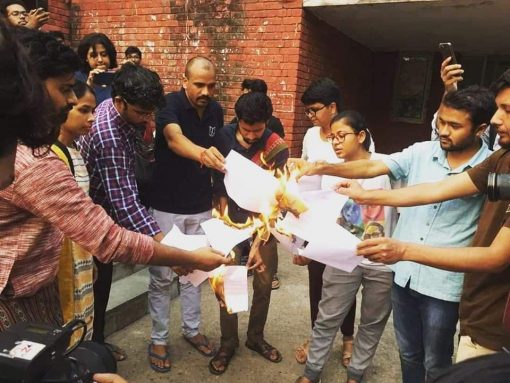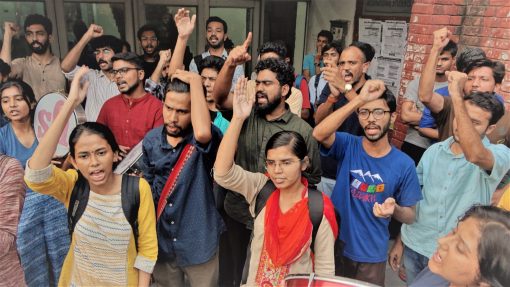
The continuing tussle between the students and the administration of the Jawaharlal Nehru University (JNU) took a new turn on Wednesday when the Dean (Students) Umesh Kadam ordered that the office of the JNU Students’ Union (JNUSU) be locked, as the results of the elections concluded in September were not notified owing to non-compliance of Lyngdoh Committee Recommendations (LCR).
The order read, “To prevent misuse of property, it is decided by the Competent Authority of the University that the said room shall be locked immediately and the same may be handed over to the JNUSU after notification of the same. Therefore, it is directed to all concerned to vacate the room on or before 5 PM on 16/10/2019 failing which the concerned authority of the university will double lock the said room.” However, JNUSU members refused to vacate the room and termed the order “an attempt to curb the democratic space at the campus”.
Aishe Ghosh, president of JNUSU told NewsClick that the clampdown on students’ voices has already begun when the public meetings were purposefully denied permission by the warden in the past and the recent order is just an extension. She said, “The office of the JNUSU remained a space where we could organise programmes without any permission from the administration. The programmes could be based on issues like abrogation of Article 370 in Kashmir. Thus, they want to muzzle the dissenting voices coming out of the campuses.”
In context of the alleged violation of the Lyngdoh Committee Recommendations, she said, “The members of the newly elected union have already submitted its expenses and they did not receive any notice regarding the violation. It is up to the administration to notify the results, not the students.”
Former JNUSU President N Sai Balaji told NewsClick that the administration is not still digesting the fact that the students has given the mandate to the union. He added, “We have seen that the unions opposed to the BJP have been dismantled. In Allahabad University, the administration ensured that a puppet union was chosen through indirect elections, whereas it is hindering the process of elections in Aligarh Muslim University. In JNU, similar attempts failed and the students elected us. So, the new order is intended to put a blanket ban on all activities.”
A closer look at the developments reveals that the recent incidents unfolding within the campus have severely affected the academics of the prestigious university. In early October, the JNU administration came with Draft Manual of Hostel Rules to be followed by the residents of 18 hostels in campus. Some of the major provisions include: a ban on the movement of hostel occupants after 11:30 pm, need for permission five days prior to meeting a person in the hostel and “appropriately dressing”. Now, the provisions have left students not only perturbed, but also disturbed.
Sangeeta Dutta, a student of MA (Sociology) hailing from Assam told NewsClick, “We have come here to study, but incidents in the last three months simply indicate that the administration is not student-friendly. I come from Assam and luckily, got the hostel. But many of my friends have not received any allotments. They are still living in private rooms outside the campus and it is costing them a fortune. How can a poor student coming from distant lands will pursue education like this? The students were overadmitted this year. So, it is the duty of the administration to provide hostels. Instead, it is coming up with these notices.”
Indu Kumari, pursuing M Phil in Women’s Studies, shared her journey from Bokaro in Jharkhand to JNU. She said, the imposition of rules regarding banning the movement after 11:30 pm is like limiting a girl into same boundaries which she transcended when she sought admission in the university. Referring to the vice chancellor, she said that he has never come to them to listen to their problems. “He does not know how many barriers we have crossed to get educated in this university. After the draft manual, we are not being allowed to take our books to library. Now, the library does not have the book and we cannot take our books there. Many hostels do not have reading rooms. So, where should I study? It's a public-funded subsidised university where students come from impoverished families who cannot afford expensive education. Through this manual, they are imposing late fines on mess bills. Many students do not take money from families and rely on scholarships. If we do not receive scholarships on time, should we be charged hefty amounts for a fault of not ours. This will certainly affect our research. As far as dissent is concerned, even Abhijit Banerjee was jailed for 10 days. Later, he got us Nobel Prize in Economics.”




